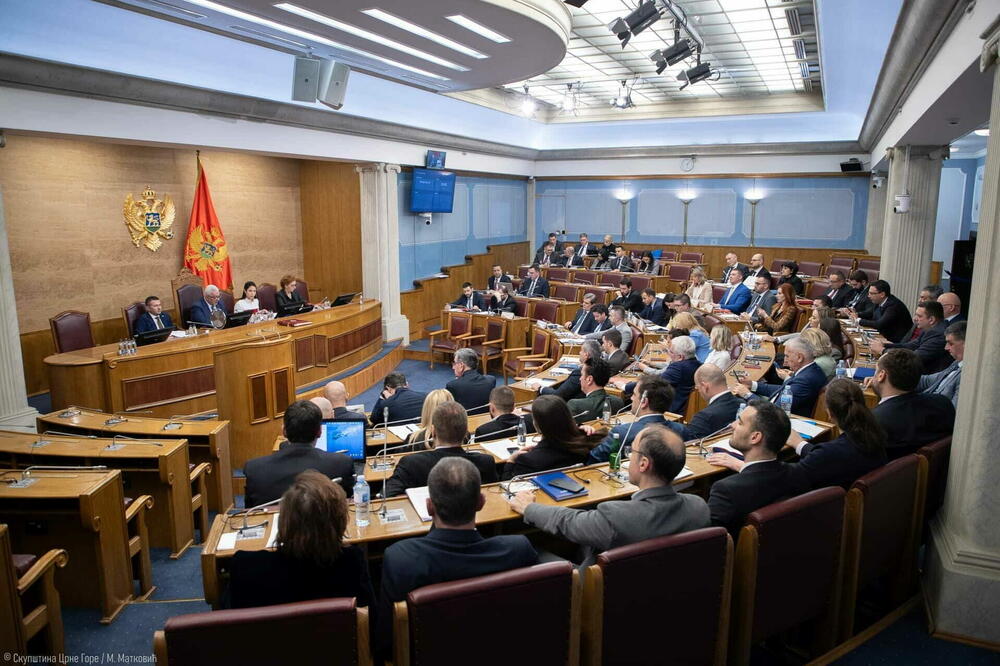The fact that representatives of the government increasingly, under pressure from the public, withdraw the bills they proposed themselves indicate frivolity and superficiality, and such hasty legislative initiatives undermine the credibility of the executive and legislative authorities.
This was assessed by the interlocutors of "Vijesti", answering the question of what kind of message is being sent by the fact that in the last few months alone, representatives of the authorities have withdrawn at least four proposed laws, the changes of which they initiated themselves.
"Frivolity and superficiality. If you send to the Assembly a legal solution that should be the sum of the needs to have a functional and fair system, if we know that this should be preceded by expert opinions and consultation with those who would apply that particular legal solution, but also with the wider public, and - in the end - that you have sufficiently skilled lawyers who know the techniques of writing laws, so if this entire sequence of steps is fulfilled, then it could very rarely happen that the law is withdrawn from the parliamentary procedure", one of the founders of Preokret told "Vijesta" Srdjan Perić.
He said that this would actually only happen when there is some extremely significant circumstance that calls for additional public, professional or political debate.
"As we know that here we rarely have the above-mentioned steps fulfilled, it is clear that in our country laws are not perceived as a tool that would allow citizens to enjoy certain rights and that would define the obligations of citizens, but as a tool that you will govern in a way that the authorities, and not the citizens, will be more comfortable," Perić pointed out.

The last example when the law was abandoned happened recently when the deputies of the Europe Now Movement (PES) Darko Dragović i Vasilije Carapić announced the withdrawal and proposed amendments to the Law on PIO, which provided for the retirement age of judges of the Constitutional Court to be raised from 65 to 67 years.
Part of the majority parties first proposed that solution through amendments to the Law on the Constitutional Court, and then through an amendment to that proposal, which was supposed to be the first item on the agenda of the Assembly session that began yesterday. However, they withdrew the proposal at the beginning of April, because, as the deputy of the New Serbian Democracy announced Slaven Radunović, did not pass the Legislative Committee, and they found an "alternative solution". The ruling Democrats and the opposition Democratic Party of Socialists (DPS) were against the proposal to amend the Law on the Constitutional Court at the session of the Legislative Committee. In the end, no one voted for the proposal.
Amendments to the Law on the Constitutional Court were submitted by MPs, in addition to Radunović Vladislav Bojović (DNP), Nikola Camaj (AF), Bogdan Božović (SNP) and Čarapić.
Program Director of the Center for Civic Education (CGO) Petar Djukanovic told "Vijesti" that the first message that is sent is not good in the context of capacity building of the authorities, because it indicates insufficient preparation, lack of knowledge, but also frivolity in the process of making serious decisions, and legal solutions undoubtedly fall into that category of decisions.
"Such hasty legislative initiatives undermine the credibility of the executive power, as well as the legislative power in cases where members of the parliamentary majority resorted to it, as well as the public's trust in the ability of the ruling structure to manage the country responsibly," said Đukanović.
He said that when amending laws, such as the most recent proposals to amend legal provisions to allow judges of the Constitutional Court to move the retirement age, are examples of attempts to abuse political power for the sake of party interests.
"Namely, the proposed solutions would lead to the compromise of the Constitutional Court, discrimination against regular judges and a series of other problems in the otherwise difficult process of establishing a functional rule of law," Đukanović assessed.

He said that, thanks to the strong reaction of the public, primarily the civil sector, but also the professional public, and then the European Commission (EC), the proponents withdrew those proposals.
"That second message is good, because a kind of recognition was made that damage to the public interest would be done and that was prevented. However, all of this reminds us of the importance of consultation with all relevant actors, in an adequate time frame, in order to produce better quality solutions, which is currently missing, so there are enough of these jumps or non-compliances", Đukanović assessed.
Among the proposed laws that the government representatives withdrew was the proposal for the Law on Electronic Communications, which the European Union (EU) delegation also assessed as not being in line with Montenegro's obligations from the EU accession process and called on the parliamentary majority not to adopt the law without consulting with EK. Vice President of the Parliament of Montenegro Zdenka Popović (Democrats) announced in January, as the proposer, that she was withdrawing the Bill. Previously, the Parliament adopted the law, and the President of Montenegro Jakov Milatovic refused to sign it and sent it back to the Assembly for re-decision.
At the end of December last year, the proposal of the Law on Amendments to the Law on Veterans and Disability Protection, which did not cover all civilian victims of the war, was withdrawn from the parliamentary procedure. The draft law, submitted by MPs of the New Serbian Democracy and the Democratic People's Party Dejan Đurović, Milan Knežević, Simonida Kordić, Maja Vukićević, Slaven Radunović, Milun Zogović, Milan Lekić, Vladislav Bojović, Jovan Jole Vučurovii Vaso Obradović, stipulated that only those from the conflict with NATO in 1999 are considered civilian victims of war. Against the bill were the families of war victims who would be discriminated against by this law, the NGO sector, the Bosniak Council in Montenegro and part of the public.
The Legislative Committee of the Parliament of Montenegro determined at the end of December last year that the Proposal for the Law on Amendments to the Law on Local Self-Government does not agree with the Constitution of Montenegro, which is why the proponents withdrew it from the parliamentary procedure. That proposal stipulated, among other things, that in case the competent election commission does not determine or announce the final results of the election within 60 days from the date of the election, they create the conditions for derailing the process and by confirming the mandate of the newly elected councilors.
The proposers were Vasilije Čarapić (PES), Boris Bogdanovic (Democrats), Milan Knežević (DNP), Slaven Radunović (NSD), Nikola Camaj (AF) and Bogdan Božović (SNP).
At the end of March, the Government also withdrew "from the publication procedure" in the Official Gazette the Decision on the dissolution of the assembly in Šavnik and the appointment of the board of trustees, which it had adopted two days before. This was done because the decision of the Municipal Assembly (SO) of Šavnik to shorten the mandate entered into force on the day of adoption, while the decision of the Government was supposed to enter into force on the day of its publication in the Official Gazette.
Đukanović assessed that politicians must be responsible when creating public policies and making decisions, because the lack of prior analysis can seriously threaten not only their success and legitimacy, but also pose unnecessary challenges for the entire society.
"When proposing laws or amendments, the government would have to thoroughly analyze the problem it addresses, have relevant information, ensure public discussion and transparency of the procedure in order to arrive at a well-founded proposal. Laws cannot be the result of speed or an attempt to solve a party problem, but quality and public interest must be insisted on," Đukanović assessed.
Perić said that it is particularly problematic that there is no idea how meaningful it is to enact systemic laws, because they prescribe how the system functions in very important areas.
"That type of legislative initiative is not only absent, but interventions in this sense are used to distort both the political and legal system - and to the benefit of the interests of political oligarchies. A vivid example is when the Law on Amendments to the Law on Local Self-Government extended the election day by several months. And that law was judged unconstitutional by the Constitutional Court," said Perić.
He pointed out that the government's response to public criticism is a positive thing, but it also speaks to the (poor) quality of those solutions.
"And to make sure there is no dilemma, it is usually a matter of pure political calculation because they believe that by persevering they would suffer damage in the "voter base", and not that they saw that a solution was not logical and/or fair. Because if you believe that a solution is of good quality and in the interest of the community and you are determined to defend the common good, you will defend it even at the cost of your own political damage. I don't have to explain the obvious in particular: this has not happened in our country for decades," said Perić.
Inadmissible proposing laws that will privilege the interests of the authorities
Petar Đukanović said that he is concerned about the trend in proposing laws that will privilege, above all, the interests of the current government, to the detriment of the public interest.
"There were too many cases when legal solutions were adjusted to satisfy narrow party interests. Such an approach is inadmissible and irresponsible, in complete contrast to the democratic reforms that the EU integration process requires, which should lead to an orderly society that has mechanisms to control the whims of politicians who lack knowledge and responsibility," said Đukanović.
Perić said that there has been a three-decade practice of laws that were often tailored to the measure of a narrow circle of people in power and those close to them, to laws that in the past few years have often been drafted according to the needs of the political interests of one party or another, or several of them.
"Therefore, it is not a general interest but a party interest, which can also be reflected in the need to promote some measure as your merit, say in the field of social benefits, up to favoring topics that are part of your political agenda," Perić said.
Bonus video:




